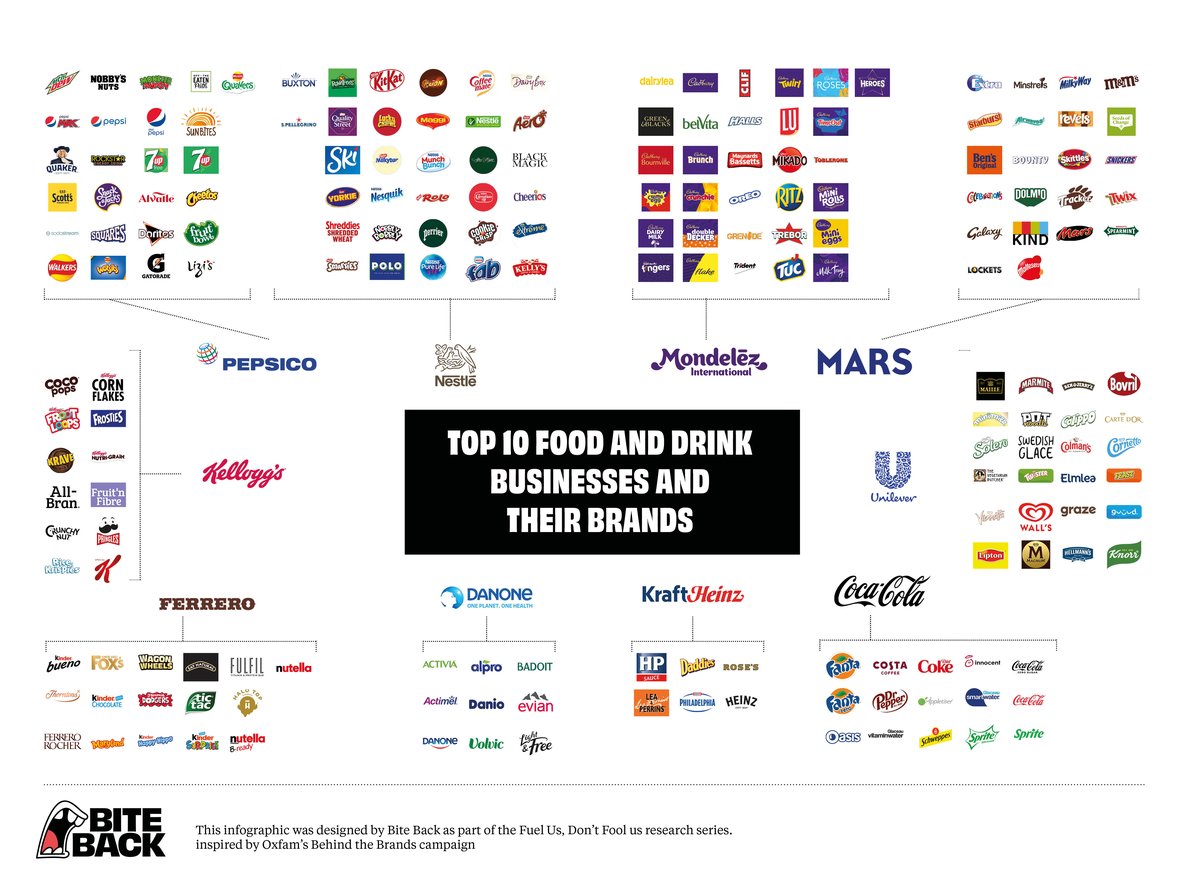Fuel Us, Don’t Fool Us

Our food system is broken, and young people are paying the price with their health. Children are growing up in a food environment awash with highly processed unhealthy food and drinks, with food giants targeting young children with cute cuddly marketing tactics and bombarding teenagers and young adults with predatory marketing tactics.
It’s become so normal that junk food is the cultural wallpaper in the lives of young people growing up in the UK. And it’s creating a preventable health crisis with over a third of 10/11-year-olds facing an increased risk of food related illnesses in their futures.
The current food system is largely dominated by multinational food businesses, turning over billions every year. Food giants say they are part of the solution. But how far do their actions match their words?
Biteback started by investigating the 10 biggest global food and drink businesses operating in the UK and looking at their sales of packaged food and drinks products.
They reported 4 key findings:
- The majority of global food manufacturers are reliant on selling unhealthy products in the UK.
For seven of the 10 businesses we investigated, analysis conducted by the University of Oxford indicates that in 2022, more than two-thirds of their packaged food and drink sales came from products that are classed as high in fat, sugar or salt (HFSS) and therefore unhealthy. Two businesses take nearly ALL their food and drink sales from unhealthy food and drinks. Just two businesses in the top 10 take less than a third of their sales from unhealthy products. And the top five categories of food and drink products by sales value are chocolate, savoury snacks, reduced sugar soft drinks, regular soft drinks and ice cream – none of which are reflected in the Eatwell Guide.
- The biggest food manufacturers are dominating digital advertising spend in food categories such as chocolate, crisps and ice cream.
A wealth of evidence now demonstrates the link between food advertising and the food and drink products children prefer, ask for and eat. Bite Back’s analysis of Nielsen Ad Intel advertising spend data found that in 2022, all food manufacturers in the UK spent £55 million on online adverts for food and drink products from four food categories that are associated with children’s excess sugar and calorie intake (biscuits, chocolate, crisps and ice cream). Seven of the top 10 food businesses were behind £50 million (91%) of this spend, resulting in 6.5 billion advertising exposures.
- Seven of the top 10 businesses are using child-appealing tactics on packaging for unhealthy food.
Packaging is a powerful marketing tactic when it comes to children with cartoon characters, use of ‘fun’ images, bright colours and unusual names or shapes all effective strategies to target young children. We found that seven of the top 10 businesses are using child-appealing packaging for unhealthy foods. This includes cartoon characters, fun playful images and even products shaped like toys or animals.
- Voluntary action by businesses to make their products healthier has had mixed results.
Food and drink manufacturers can reformulate the recipes of their products to make them healthier, for example by decreasing levels of fat, salt and sugar, and increasing levels of fibre. The UK Government’s voluntary sugar reduction programme challenged industry to achieve a 20% reduction in sales-weighted averages of sugar by 2020 (from a baseline of 2015), but overall progress was disappointing with the most limited progress in categories that have the highest volume of unhealthy sales.
As a result of their findings, Biteback have made some key recommendations to food businesses and the Government who hold the levers of change and need to take action NOW if they want to be on the right side of history…
Actions for Food Businesses
- Set and report on a healthier sales target as a proportion of total volume sales and based on the 2004/2005 Nutrient Profiling Model.
- Address unhealthy marketing by phasing out advertising of products high in fat, sugar or salt and introducing clear and transparent labelling (including colour-coded front-of-pack labelling and removing health and nutrition claims or cartoon and brand equity characters on unhealthy products).
- By 2024, set a 1.5°C aligned target verified by SBTi for all greenhouse gases and including scope 3 emissions, cutting emissions by 50% by 2030 and reaching net zero no later than 2050. Progress should be overseen by a named board member with responsibility for children’s health.
Actions for Government
- Fully implement legislation restricting the marketing of food and drinks high in fat, sugar or salt on TV, online and in retail environments and extend to other types of marketing including outdoor, brand advertising and sports sponsorships.
- Bring in mandatory colour-coded front-of-pack labelling and stop the use of cartoon characters and other child-appealing tactics along with health and nutrition claims on the packaging for unhealthy food and drinks.
- Mandate businesses to report publicly and consistently on sales of unhealthy food and drinks and sustainability metrics on a yearly basis.
- Explore measures to incentivise healthier food and drink production beyond the Soft Drinks Industry Levy, including use of further financial levers.
WHAT NOW?
Does all of this make you as angry as we are? Then join us and demand action from these companies.
Fuel Us, Don’t Fool Us – the latest campaign by Biteback
By Lisa Aldwin, Programme Manager, Eat Smart Sheffield
